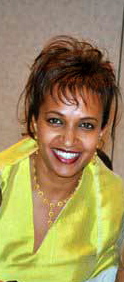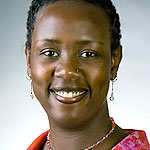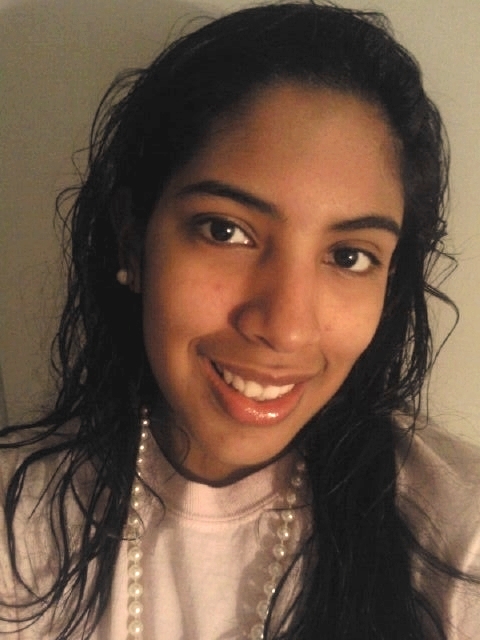Champions of Change Blog
Education as a Key to Eradicating Poverty
Posted by on January 31, 2012 at 9:41 AM EST I am honored and humbled to be a White House Champion of Change. I arrived in the United States as an Ethiopian immigrant at the age of 17 and later became a naturalized U.S. citizen. Now I work as a patent examiner for the U.S. Patent and Trademark Office. Still, one of my most important accomplishments is serving as the president of a dynamic non-profit organization called Wegene Ethiopian Foundation (WEF), which I founded with the help of my friends and family members in the year 2000.
I am honored and humbled to be a White House Champion of Change. I arrived in the United States as an Ethiopian immigrant at the age of 17 and later became a naturalized U.S. citizen. Now I work as a patent examiner for the U.S. Patent and Trademark Office. Still, one of my most important accomplishments is serving as the president of a dynamic non-profit organization called Wegene Ethiopian Foundation (WEF), which I founded with the help of my friends and family members in the year 2000.I am extremely grateful for the security, opportunity for education, and better life my adoptive country, the United States, has provided me and my family. I believe it is my privilege and duty to give back to both my birth country and the U.S. in any way I can. As a result, it is especially rewarding to be part of a foundation that provides fundamental change to less fortunate families sustaining themselves at the price of one cup of coffee per day and to make a difference for these families and their communities. This is really the finest sort of empowerment, where we all can be partners and the ownership belongs to our partners who benefit from the program. As a partner of Wegene, I have the opportunity to make a difference at a personal level. This offers me fulfillment and civic satisfaction beyond imagination. Wegene’s vision and strategy is simple because the resources are deliverable and the overhead cost is near to nothing. Additionally, almost everyone involved is donating their time, money, and contacts in kind to this noble work.
Through a sustainable manner, Wegene’s mission is to improve the everyday lives of less fortunate and disadvantaged children and their families in Ethiopia. This mission is based on the philosophy that if hardworking, destitute families are given the opportunity, tools, and resources to improve their lives, they will have a stepping stone to emerge from the poverty cycle and give their children better educational opportunities in order to lead happier, healthier lives. Wegene creates opportunities for families to become self-sufficient through vocational training and small start-up grants.
Making the Impossible Possible for African Women
Posted by on January 31, 2012 at 9:30 AM EST At Akili Dada we deal in miracles and dreams. We exist to make the impossible possible in a world that doesn't believe that African women can. We are passionate about African women's leadership and are working towards a future where African women will have full and fair access to decision-making tables. We do this by functioning as a leadership incubator investing in high-achieving young African women from underprivileged backgrounds who are passionate about social change.
At Akili Dada we deal in miracles and dreams. We exist to make the impossible possible in a world that doesn't believe that African women can. We are passionate about African women's leadership and are working towards a future where African women will have full and fair access to decision-making tables. We do this by functioning as a leadership incubator investing in high-achieving young African women from underprivileged backgrounds who are passionate about social change.We invest in young women like Faith, one of Africa’s new generation of dazzling young social entrepreneurs and co-founder of Azma.co.ke. Started by a group of young women in high school, the innovative online platform allows high school students from across Kenya to connect, exchange ideas, and organize community service activities, mentoring, and outreach events in communities around the country.
We are also investing in Gloria, the daughter of casual laborers who survived Kenya's gory Post-Election violence after watching her baby brother burned alive in their meager home. She has twice emerged among the country's top students and is now thriving on a full scholarship to medical school. Displaying a resilience rare in one so young she writes, "I dream day and night of how I am going to transform my community, society and country at large. I want to make a difference and Akili Dada has empowered me to do just that."
Akili Dada also intervened in the lives of Sharon and Winnie when lack of school fees had them on the verge of dropping out of the top-ranked high schools in the country. Both are now thriving on full scholarships at some of the best universities in the United States and are active members of their new American communities. Describing her experience mentoring girls at a local high school Sharon writes, “every time I spend time with girls at Poughkeepsie high school I take pride in trying to show them that being poor does not necessarily mean [being] undignified. I know this because everyone in Akili Dada has modeled it to me.”
Ready to Read: Advocating for Literacy in Today's Youth
Posted by on January 31, 2012 at 8:50 AM ESTI am humbled to have been selected as a Champion of Change and to have the opportunity to represent the achievements of American diaspora communities with roots in the Horn Africa. The Horn of Africa and specifically Somalia, where I was born, is a region that is deeply impacted by political instability, extreme poverty and refugee crises. Immigrants and refugees from Somalia who come to the United States have to overcome not only the trauma of forced migration and civil war but many settle in high poverty communities where they struggle along with their fellow Americans to emerge from a cycle of intergenerational poverty. My interest in helping Somali refugees and low-income Americans to emerge from poverty and improve future outcomes for their children led me to join Columbus Metropolitan Library Ready to Read Corps.
As part of the Ready to Read Corps, I take the library into at-risk communities to teach parents and caregivers of children between the ages of 0-to-5 on how to be their child’s first teacher and prepare their children for kindergarten. We teach parents to develop their child’s literacy skills and show parents how taking little steps can have an impact on preparing a child to succeed in school. To reach low-income parents we work with food pantries, preschools, churches, social service offices, mosques, hospitals, schools, high school teen parent program, and we even hold trainings in people’s homes. We bring the library to the community and work with diverse low-income populations in Columbus, Ohio, which is home to the second largest Somali immigrant and refugee community in the United States.
In some local schools, 40% of the children entering kindergarten are not adequately prepared to succeed in school, according to the Ohio Department of Education’s Kindergarten Readiness Assessment Literacy (KRA-L) scores. In some local immigrant neighborhoods, that score is as high as 77%. These early inequalities in school preparation have been proven in numerous research studies to adversely impact a child’s academic and lifelong success because children are continually attempting to catch up to their more affluent peers. The Ready to Read Corps of Columbus Metropolitan Library is an innovative early literacy program that works to prevent these persisting educational inequalities by educating and empowering parents and is an integral component in the fight against poverty.
To date, Columbus Metropolitan Library has raised almost $1.5 million to fund the Ready to Read Corps – nearly $1 million from grants and the rest were donations from United Way of Central Ohio, the Siemer Family Foundation, JPMorgan Chase and Nationwide Insurance Foundation. I believe that education is the great equalizer and I am grateful that Columbus Metropolitan Library’s Ready to Read Corps has allowed me this wonderful opportunity to make such a positive impact in the community.
Rural Educator Bringing Change
Posted by on January 30, 2012 at 10:58 AM ESTIn 2005 when I first began working with the Alamance-Burlington School System in North Carolina to start a college access and career awareness program, “What’s After High School?,” this quote in the office at Eastern Alamance High School caught my attention and I wrote it down:
Perhaps the most valuable result of all education is the ability to make yourself do the thing you have to do, when it ought to be done, whether you like it or not. This is the first lesson to be learned. –Thomas Huxley
Later I thought to myself, “that’s really what college access is…teaching young people about the world and opportunities beyond where they live, showing them how a college education can help them realize those opportunities and equipping them with the tools and resources to do what they ‘have to do, when it ought to be done, whether (they) like it or not’…”
Prior to working with the local school system, in 2004 I organized a group of friends to start “YES I CAN,” a one-time, faith-based college access program at Children’s Chapel United Church of Christ. Our goal was to serve 25 African American children in grades 6-12 and their parents to help them understand how to be successful in school, prepare for college and pay for it. By the end of the summer we had served more than 100 students and parents. Seven years later the YES I CAN Program is now Youth Enrichment Series, Inc., a 501c3, serving students in grades 3-12. Parents, friends, family and colleagues play a major role in this all volunteer operation. Our graduates and former student advisors are enrolled in or graduates of more than twenty 2- year and 4- year colleges and universities in North Carolina and other states. I was encouraged to contact the Alamance-Burlington School System about opportunities to develop college access programming to impact all students and families in our community. That’s how the “What’s After High School?” Program was conceived.
Increasing Access and Supporting Catholic Education
Posted by on January 25, 2012 at 1:30 PM ESTI believe the success of the great American experiment is inseparably intertwined with a commitment to opportunity for everyone—that every person will have an opportunity for happiness, an opportunity to fulfill their potential, an opportunity to be safe, gainfully employed, prosperous in the most important ways. I believe that outside of the role of family in an Americans’ lives, the role education plays in achieving these goals of equal opportunity is paramount. Without the foundation of a first rate education, few people would have many opportunities at all. Put another way, when America succeeds at education, we succeed at being America. When we fail at providing the best education for even a single child, in that moment we fail as America because for that child we know there is little opportunity.
For this reason, I am grateful to the White House for choosing to honor individuals in the field of Catholic education this week as “Champions of Change,” for I believe Catholic schools are an essential component of a successful American education system, and therefore a successful America. We know Catholic schools have a history of succeeding with marginalized populations. After all, Catholic schools began in America hundreds of years ago with the very purpose of serving poor immigrant populations, whole groups of new Americans that generations later have risen up in this land of opportunity. Yesterday’s poor Catholic immigrants sat in the desks of rigorous, values-based, Catholic school classrooms, and today the descendants of those first Catholic school students are more often than not actualizing the American dream.
Youth Community Initiatives: Staying Active and Giving Back
Posted by on January 25, 2012 at 1:30 PM EST
Being involved in activities, sports and taking the initiative in being a leader in my community were things I just did because I felt I should do something productive with my time. Whenever I get involved in my community I try to convince other people to join me because it is so much more fun when community service is done in groups. I would have never thought I would receive an award for all of the little things I do in my community. Mother Teresa said “What we are doing is just a drop in the ocean. But if that drop was not in the ocean, I think the ocean would be less because of that missing drop.” Mother Teresa does have a point; every little thing we do to better our community does make a big difference in the future.
Ever since I was little I always wanted to do something for the betterment of my community. I did not know how to start until an opportunity arose during the summer before my sophomore year. I attended a program called AMYLA, and the manager of the program gave me the idea of starting a day camp for children in the community. If the program was going to happen, it would have to be my responsibility to start it and organize it. I was frightened at first, because how could a 14-year-old start a day camp all by herself? But after doing a little bit more thinking about it, I was convinced to take on this challenge and make the community better with this day camp. After taking the initiative to organize and the responsibility of being camp manager, the day camp was a dream come true. The day camp had 10 children, a good number for the first year.
When that summer had passed, I realized I had the capacity to do whatever I wanted to if I put my mind to it. After the day camp, I felt like I should get more involved in my school community. I started signing up for extracurricular activities. My sophomore year, I applied to the International Baccalaureate Diploma Program and participated in volleyball and stage crew. Being involved in my school community felt great because I felt like I was a part of something bigger than myself.
Entering my junior year, I wanted to participate in more activities and be productive after school. I was involved in Carroll Food Drive, volleyball, basketball, Augustinian Scholars, Peer Ministry, National Honor Society, lacrosse, the International Baccalaureate Diploma Program, mentoring and stage crew. I was juggling all these extracurricular activities during the year. During my senior year, I am still involved in these extracurricular activities. I always invite friends to do activities with me. We as students can make small changes that can better our community.
I hope I can inspire other teenagers to take the initiative to be leaders in their community and go above and beyond. It is never too early to start making a change in your community. Do not let negative ideas such as 'you’re too young' affect what you want to do in your community. We as teenagers are responsible for the future, and we can make a difference.
Bertha Castenda serves is a senior at Archbishop Carroll High School in Washington, D.C., where she maintains a 4.0+ GPA in the International Baccalaureate Diploma Programme, one of the toughest college prep curriculums available world-wide. .
- &lsaquo previous
- …
- 136
- 137
- 138
- 139
- 140
- 141
- 142
- 143
- 144
- …
- next &rsaquo
White House Blogs
- The White House Blog
- Middle Class Task Force
- Council of Economic Advisers
- Council on Environmental Quality
- Council on Women and Girls
- Office of Intergovernmental Affairs
- Office of Management and Budget
- Office of Public Engagement
- Office of Science & Tech Policy
- Office of Urban Affairs
- Open Government
- Faith and Neighborhood Partnerships
- Social Innovation and Civic Participation
- US Trade Representative
- Office National Drug Control Policy
categories
- AIDS Policy
- Alaska
- Blueprint for an America Built to Last
- Budget
- Civil Rights
- Defense
- Disabilities
- Economy
- Education
- Energy and Environment
- Equal Pay
- Ethics
- Faith Based
- Fiscal Responsibility
- Foreign Policy
- Grab Bag
- Health Care
- Homeland Security
- Immigration
- Innovation Fellows
- Inside the White House
- Middle Class Security
- Open Government
- Poverty
- Rural
- Seniors and Social Security
- Service
- Social Innovation
- State of the Union
- Taxes
- Technology
- Urban Policy
- Veterans
- Violence Prevention
- White House Internships
- Women
- Working Families
- Additional Issues

